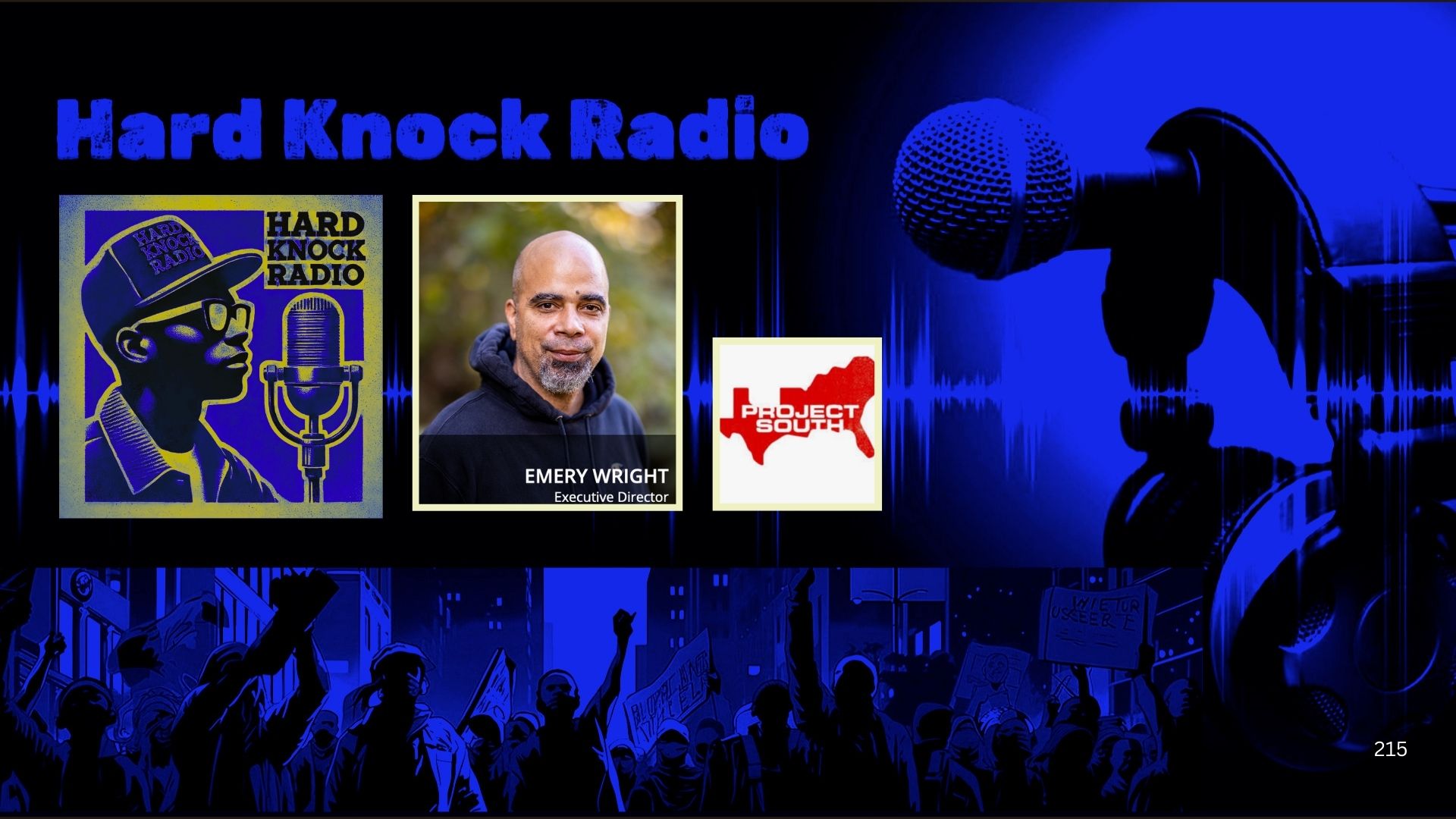(HKR-11-25-24)In a recent episode on Hard Knock Radio, host Davey D spoke with Emery Wright, executive director of Project South. The pair discussed the organization’s mission, the legacy of the Black Radical Tradition, and the fight against systemic oppression. Additionally, they also discussed the often overlooked role of the South in shaping America’s socio-political landscape. The conversation illuminated Project South’s historical roots, ongoing initiatives, and the necessity of grassroots organizing in the face of growing authoritarianism.
A Legacy of Resistance and Empowerment
Founded in 1986, Project South emerged from the intersection of the Black Freedom Struggle in the South and labor movements originating in Detroit, such as the League of Revolutionary Black Workers. Wright emphasized that the organization’s foundation is deeply tied to the Black Radical Tradition—a movement opposing systemic oppression since the transatlantic slave trade.
“The Black Radical Tradition,” Wright explained, “is about the total liberation of our people and all oppressed people. It’s not a reformist tradition but one aimed at addressing the root causes of systemic injustice.”
Parallel Organizing: Lessons from History
Davey D and Wright delved into the history of parallel organizing. They highlighting the Lowndes County Freedom Organization (LCFO), a precursor to the Black Panther Party. Founded in Alabama during the 1960s, LCFO used grassroots strategies to create alternative political and social infrastructures. Wright noted that the LCFO not only ran successful candidates for local office but also established co-ops and community education initiatives to empower Black citizens.
This model of organizing parallel to dominant systems, Wright suggested, holds critical lessons for today. “We can’t just live in isolation or only contend with the existing system. We must do both—organize against it and build a future beyond it.”
Facing Modern Challenges: Project South Today
Wright underscored the increasing challenges facing grassroots organizations under growing authoritarianism. Recent legislative actions, such as House Bill 94-95, signal attempts to suppress dissent by labeling nonprofit organizations as potential threats. Wright expressed concern over the criminalization of activism, citing how Project South and similar organizations face direct threats under these laws.
Yet, Wright remained steadfast, advocating for noncompliance with unjust policies and emphasizing the importance of collective action. “Fear is natural,” he noted, “but we can’t let it stop us from doing what needs to be done.”
Building Readiness and Resilience
Through initiatives like the Southern Movement Assembly and the Get Ready, Stay Ready campaign, Project South equips communities with readiness plans to face emergencies—whether natural disasters or political upheavals. Wright highlighted how lessons from disasters like Hurricane Katrina underscore the importance of self-reliance and community-building. For more info check out their instagram at Projectsouthatl
“From grassroots leadership development to regional coordination,” Wright explained, “we are working to ensure that communities across the South and the global South are prepared to navigate these turbulent times.”
A Call to Action
The conversation concluded with a rallying call for collective action. Wright invited listeners to join the State of the South Call on December 14, part of Project South’s effort to unite communities and amplify resistance strategies.
“We’re in a moment of global change,” Wright said. “The future is unknown, and we cannot afford to let the 1% determine what’s on the other side. It’s up to us to build the world we want to live in.”
Takeaways
- Project South’s Legacy: Grounded in the Black Radical Tradition, the organization continues to fight systemic oppression through education, grassroots organizing, and parallel infrastructures.
- Lessons from History: Examples like the Lowndes County Freedom Organization serve as blueprints for building community-led alternatives.
- Action Against Authoritarianism: In an era of escalating threats to democracy, collective action, readiness, and noncompliance with oppressive systems are vital.
- Global Solidarity: Liberation is interconnected, spanning the African diaspora, immigrant communities, and global resistance movements.
To learn more about Project South or to participate in their upcoming initiatives, follow them on Instagram (@SouthernPeoplesPower) or visit their website. As Wright aptly stated, “Nobody’s free until everybody’s free.”


Leave a Reply